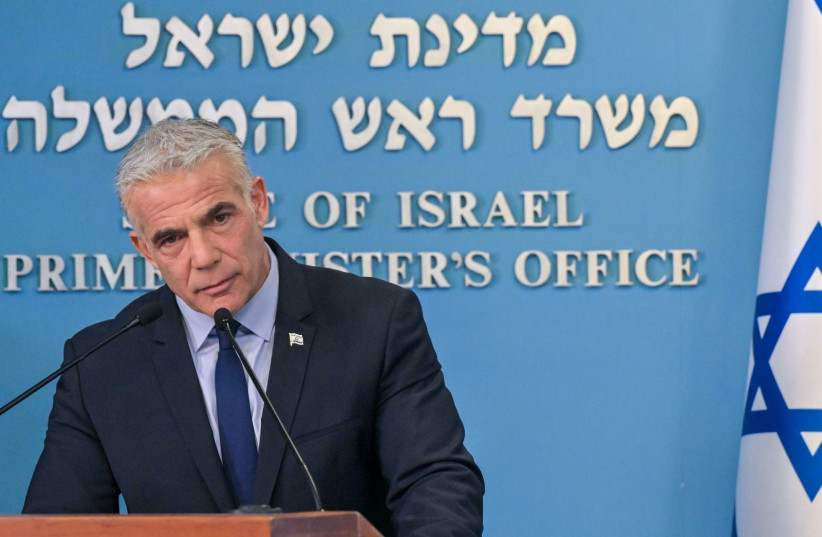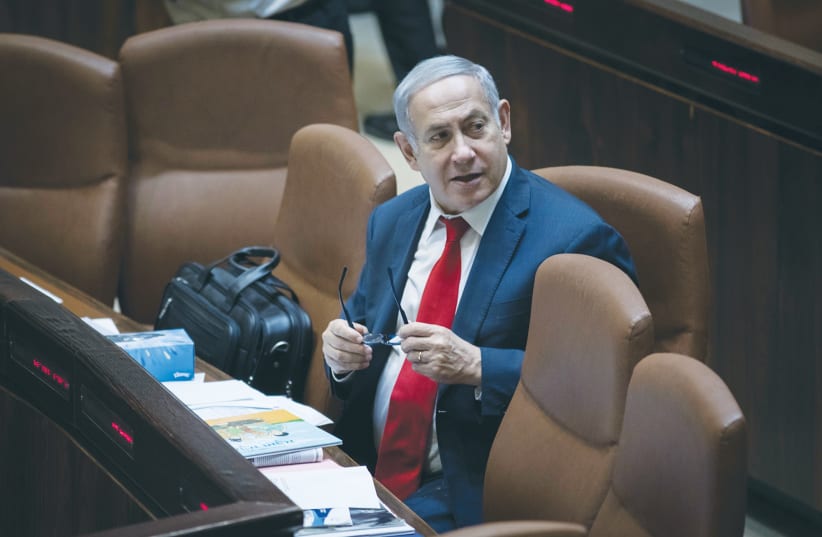On Wednesday evening, former prime minister Benjamin Netanyahu took to the podium at Likud headquarters in Tel Aviv and addressed the nation, live on Facebook.
“I want to direct your attention to a development that casts a heavy shadow on our security and our future”, Netanyahu said, with a solemn and worried expression. He warned about the “horrible,” “dangerous” and “very, very bad” deal emerging between Iran and the West.
The impromptu stage and Israeli flags in the background mimicked the briefing room in the Prime Minister’s Office, and, as always, Netanyahu accompanied his speech with a visual presentation.
One could easily have a sense of déjà vu. Once again, Washington is seeking to strike a deal with Tehran, and Netanyahu is warning of impending disaster.
A few hours earlier, he had the same message for foreign audiences, and gave alarming interviews on Fox News and Al-Arabiya. “I think this is a horrible deal, a dangerous deal that will pave Iran’s path with gold, a golden paved highway to a nuclear arsenal,” he cautioned. “This is madness! This is the height of folly!”


For moments, it was 2015 all over again.
But only for a few moments. Despite Netanyahu’s efforts to adorn his campaign headquarters with a premiership-like setting, he is not the prime minister; Yair Lapid is the one spearheading the Israeli efforts to thwart the revival of the Joint Comprehensive Plan of Action (JCPOA).
Same message, different delivery
A few hours before Netanyahu’s statement, Lapid himself told foreign reporters the proposed deal is bad, and should it be signed, it will not bind Israel.
Their messages were essentially the same, but markedly different in their style, tone and background. Since entering office last year, the Bennett-Lapid government’s line has been to handle tensions and disagreements with the Biden administration discretely, influencing behind closed doors. Its approach stands in stark contrast to Netanyahu’s blunt and vocal 2015 battle against president Barack Obama, which climaxed with the former prime minister’s speech in Congress in March 2015.
In between the two Democratic administrations that pursued a nuclear deal came one Donald Trump, who abandoned it in 2018, unleashing Iran to speed up its uranium enrichment, avoid international inspections and reach the most advanced point ever in its nuclear program.
When former prime minister Naftali Bennett first replaced Netanyahu last year, he said he was “devastated” to discover the neglect of the Iranian file during his predecessor’s tenure.
However, Netanyahu’s general approach to the deal dominates the political narrative and is rarely challenged. Hence, from the Israeli point of view – which is shared by Netanyahu and Lapid and most of the top security brass – the new deal now on the table suffers from the same fundamental flaws as the original deal, but meanwhile, Tehran has become so much stronger, so it’s actually worse.
Reports of progress in efforts to revive the deal shifted Jerusalem to emergency mode: Lapid sent his national security adviser, Eyal Hulata, to Washington for talks with his counterpart, Jake Sullivan, this week. He will be followed by Defense Minister Benny Gantz, who added a brief US weekend stop before flying out to a prescheduled visit to Japan next week. In a series of tweets on Tuesday, Bennett called on the US administration not to sign an agreement with Iran and proclaimed Israel is not committed to any of the restrictions stemming from it. The day after, Lapid summoned the foreign press for a special briefing in the Prime Minister’s Office. And minutes after it started, Netanyahu’s spokesman announced a press conference of his own, as well as a foreign media offensive.
The Iran deal is Netanyahu’s baby, and talking about it brings him back to his element, and to a much more natural zone than the current topic leading the Likud campaign – the economic crisis and the cost of living.
As soon as he identified Lapid and Bennett’s alarmist change of tone signaling that an agreement is under way, he rushed to demand ownership and capitalize on it for his own campaign interests. Just like in 2015, going live on US morning shows to warn about a bad deal also serves internal purposes. Netanyahu attributes at least part of his electoral victory that year to the congressional offensive and the public diplomacy push that surrounded it, even if it didn’t reach its strategic goal of thwarting the deal and ignoring the deep scars it left on the US-Israel relationship. Now that the deal is back, he plans to use it again as a centerpiece of his campaign, to reinstate his image of a respected world leader but mostly to undermine Lapid and Bennett’s polite diplomacy style with the White House and tag it as a strategic failure.
A talking point memo the Likud campaign prepared after Netanyahu’s statement accused Lapid and Gantz of “totally failing [in] the fight against the Iranian nuclear program and surrendering from day one” by committing to a no-surprises policy with the White house and agreeing not to fight about the agreement in the open.
“They decided to contain the Iranian nuclear program and live with the most dangerous deal in history,” the memo continued, and then praised how “we acted differently and led an adamant fight in international public opinion which succeeded to prevent Iran from acquiring a nuclear weapon for over a decade.”
Netanyahu's anticipated comeback
NETANYAHU IS counting on the short public memory and general lack of proficiency with the never-ending story and details of the Iran deal. If a deal is signed, he will brand it as Lapid’s defeat, even though his opposite strategy didn’t yield a better result seven years ago.
The incumbent is likely to push back on that narrative and try to taint Netanyahu’s 12-year policy and especially the 2015 debacle as a strategic disaster that damaged relations with the US and still didn’t stop the JCPOA.
The open question is how much do Israelis actually care?
According to internal public opinion research conducted by several parties, the top priorities are focused on the economic crisis and crime and domestic security, and the Iranian file does not have much impact on voting patterns.
For most Israelis, the looming teachers strike threatening to disrupt the opening of schools next week is much more alarming than centrifuges and levels of enrichment.
However, research also shows that foreign policy crises in general, including Iran, do have an impact on polls rating compatibility and suitability to be prime minister, in which Netanyahu still leads Lapid by a wide margin.
That’s one of the reasons Lapid has slightly changed his tone in the past week and moved to a more critical stance toward US President Joe Biden.
If a deal is signed, his main challenge will be to preserve the friendly and positive communication with the White House, while Netanyahu is breathing down his neck, accusing him of being too soft.
